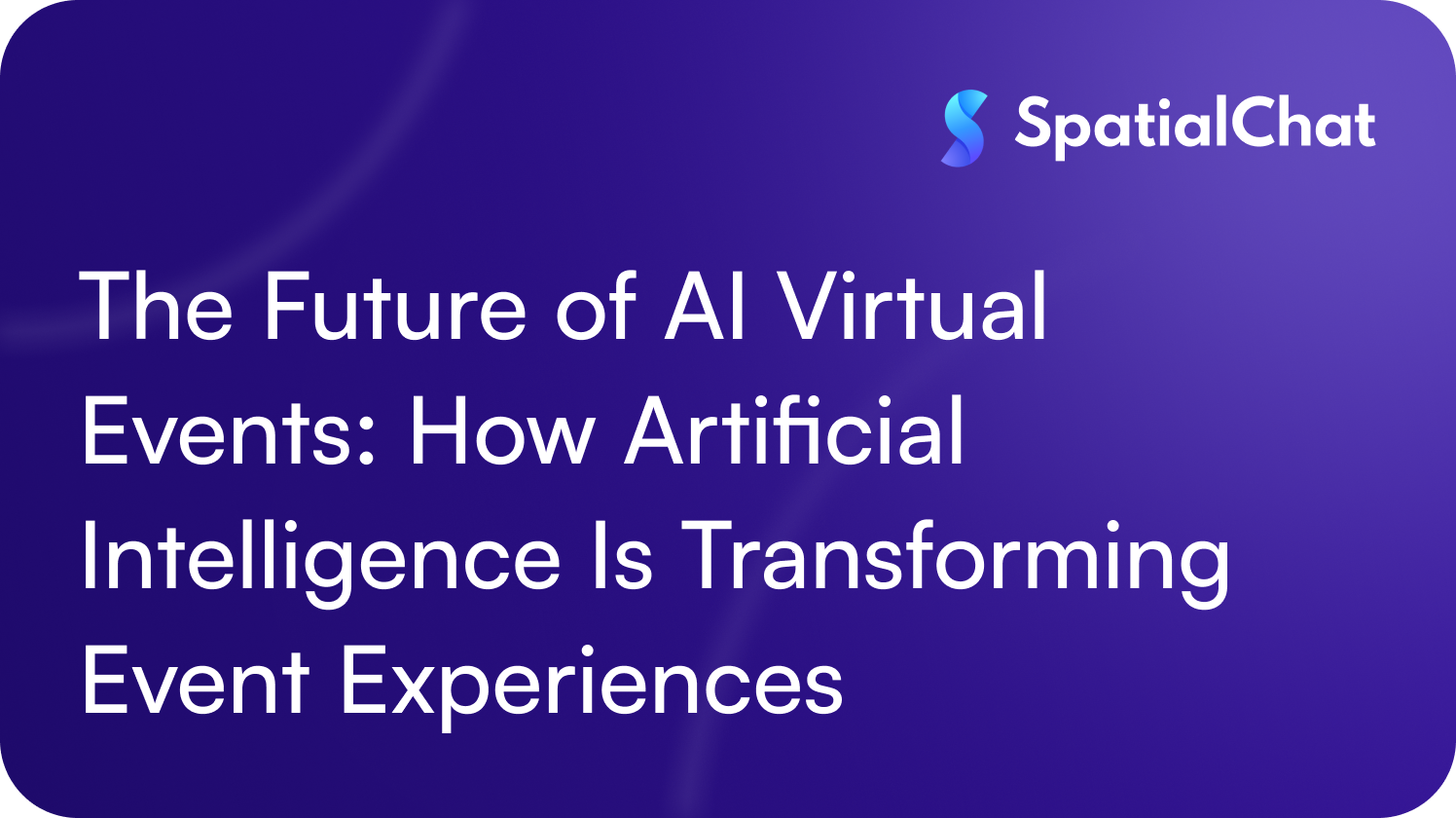The Future of AI Virtual Events: How Artificial Intelligence Is Transforming Event Experiences

Organizing a successful event, whether virtual, hybrid, or in-person, requires months of careful planning, coordination, and execution. From securing the right speakers to ensuring every attendee has a seamless experience, event planners juggle countless moving parts. Today, many professionals are turning to artificial intelligence (AI) to help manage this complexity.
While companies in industries like finance, healthcare, and entertainment have long embraced AI, its role in events has surged in recent years. Generative AI tools such as ChatGPT and MidJourney opened the door to creative and content-driven applications, and now event-specific solutions are emerging that can significantly enhance the way organizers design and deliver virtual experiences.
For planners exploring AI virtual events, the opportunity is clear: AI is not replacing people but empowering them to create smarter, more engaging, and more efficient experiences. Let’s take a closer look at how.
Why AI Matters in Virtual Events
AI has moved beyond being a buzzword and is quickly becoming a practical tool across every stage of the event lifecycle. From planning and marketing to live execution and post-event analysis, AI helps organizers save time, uncover insights, and deliver personalized experiences at scale.
But the real advantage lies in the areas where AI can do what humans can’t—processing vast datasets in seconds, recognizing patterns in attendee behavior, or providing real-time translations and captions for global audiences. For event planners tasked with delivering meaningful engagement, these capabilities open up new possibilities.
Key Emerging AI Applications in Virtual Events
1. AI-Driven Networking and Matchmaking
Networking has always been one of the main reasons people attend events. But in large conferences or virtual gatherings, it’s easy for attendees to feel lost in the crowd. AI now makes it possible to match participants based on shared interests, professional goals, or even session attendance patterns.
Imagine an attendee signing in to a virtual event and instantly being paired with peers or mentors who share their industry focus. With AI-driven matchmaking, every participant gains value from relevant, meaningful connections, thereby turning networking from a chance encounter into a guaranteed benefit.
2. Automated Captioning and Translation
Accessibility is non-negotiable for modern events. Automated captioning powered by AI ensures that every presentation, panel, or keynote is accessible to attendees who are deaf or hard of hearing. Beyond accessibility, real-time translations allow events to scale globally, bridging language barriers and opening the doors to international audiences.
For planners hosting large-scale AI virtual events, these features enhance inclusivity and expand reach while also reducing the manual work traditionally involved in captioning or hiring interpreters.
3. Advanced Analytics for Attendee Behavior
Data is at the heart of any effective event strategy. Traditional feedback surveys only scratch the surface of attendee experience, but AI enables much deeper insights.
With analytics powered by machine learning, organizers can see which sessions generated the highest engagement, when attendees were most active, and even how participants interacted within virtual spaces. These insights are invaluable for shaping future agendas, securing sponsors, and proving ROI to stakeholders.
Platforms today are developing AI-driven analytics that move beyond numbers, offering actionable recommendations to optimize both current and future events.
4. AI Chatbots for Real-Time Q&A and Support
Every event comes with a flood of questions: Where do I find the agenda? How do I join a breakout session? Can I connect with a particular speaker? Instead of overwhelming human support teams, AI chatbots can handle these inquiries instantly and accurately.
At the same time, AI-powered assistants can facilitate live Q&A sessions during panels, surfacing the most relevant or popular audience questions for moderators. This ensures that conversations remain engaging and focused, while attendees feel heard and supported.
Ethical Considerations in AI Virtual Events
As with any emerging technology, AI in events also brings challenges. Privacy is one of the most pressing. Event platforms often collect sensitive data such as personal details, attendance history, and behavioral patterns. Organizers must ensure compliance with data protection regulations and communicate clearly with attendees about how their information is used.
Another issue is bias in AI outputs. Matchmaking algorithms, for example, must be carefully trained to avoid perpetuating stereotypes or excluding underrepresented groups. Finally, intellectual property questions remain around AI-generated content, such as presentation visuals or event branding.
For event professionals, the key is to use AI responsibly by leveraging its efficiency while also maintaining transparency, fairness, and respect for participant rights.
How AI Will Shape the Future of Virtual Events
We are only scratching the surface of what AI can do for events. In the near future, AI will enable immersive VR and AR environments, creating dynamic event spaces where participants can explore, interact, and network in ways that feel almost lifelike. Personalized agendas, real-time sentiment tracking, and predictive engagement tools will make AI virtual events smarter and more interactive than ever before.
For event planners, adopting AI early is about keeping up and also staying ahead. As the technology matures, the gap will widen between those who embrace AI-powered tools and those who don’t.
SpatialChat: An Innovative Platform for AI Virtual Events
AI alone cannot deliver a great event. It needs to be built on a reliable, flexible platform too. That’s where SpatialChat shines. Designed for modern virtual and hybrid experiences, SpatialChat combines intuitive design with powerful features to make AI-driven innovation practical and impactful.
From personalized networking recommendations to data-driven analytics and intelligent chat support, SpatialChat is building AI features that directly enhance both organizer efficiency and attendee experience. Whether you’re hosting a small workshop or a global industry summit, our platform helps you deliver an event that feels seamless, inclusive, and future-ready.
Artificial intelligence is transforming the way we plan and deliver events. From matchmaking and captioning to analytics and chatbots, AI offers practical tools that save time, increase engagement, and create more personalized experiences. For organizers exploring the potential of AI virtual events, now is the time to experiment, learn, and integrate these technologies into your strategy.